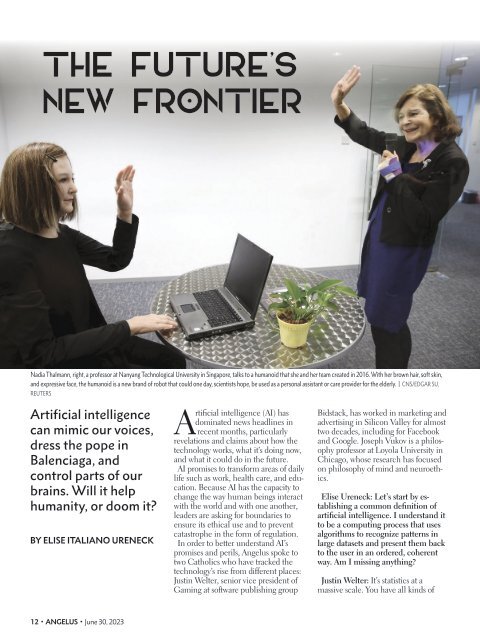Angelus News | June 30, 2023 | Vol. 8 No 13
On the cover: Everywhere you turn, it seems as if everyone is focusing on artificial intelligence — how it can be used, how it should be used, or if it should be used at all. Starting on Page 12, Elise Italiano Ureneck speaks with two Catholics experienced in artificial intelligence on how it could impact everything from education, well-being, and human demise.
On the cover: Everywhere you turn, it seems as if everyone is focusing on artificial intelligence — how it can be used, how it should be used, or if it should be used at all. Starting on Page 12, Elise Italiano Ureneck speaks with two Catholics experienced in artificial intelligence on how it could impact everything from education, well-being, and human demise.
Create successful ePaper yourself
Turn your PDF publications into a flip-book with our unique Google optimized e-Paper software.
THE FUTURE’S<br />
NEW FRONTIER<br />
Nadia Thalmann, right, a professor at Nanyang Technological University in Singapore, talks to a humanoid that she and her team created in 2016. With her brown hair, soft skin,<br />
and expressive face, the humanoid is a new brand of robot that could one day, scientists hope, be used as a personal assistant or care provider for the elderly. | CNS/EDGAR SU,<br />
REUTERS<br />
Artificial intelligence<br />
can mimic our voices,<br />
dress the pope in<br />
Balenciaga, and<br />
control parts of our<br />
brains. Will it help<br />
humanity, or doom it?<br />
BY ELISE ITALIANO URENECK<br />
Artificial intelligence (AI) has<br />
dominated news headlines in<br />
recent months, particularly<br />
revelations and claims about how the<br />
technology works, what it’s doing now,<br />
and what it could do in the future.<br />
AI promises to transform areas of daily<br />
life such as work, health care, and education.<br />
Because AI has the capacity to<br />
change the way human beings interact<br />
with the world and with one another,<br />
leaders are asking for boundaries to<br />
ensure its ethical use and to prevent<br />
catastrophe in the form of regulation.<br />
In order to better understand AI’s<br />
promises and perils, <strong>Angelus</strong> spoke to<br />
two Catholics who have tracked the<br />
technology’s rise from different places:<br />
Justin Welter, senior vice president of<br />
Gaming at software publishing group<br />
Bidstack, has worked in marketing and<br />
advertising in Silicon Valley for almost<br />
two decades, including for Facebook<br />
and Google. Joseph Vukov is a philosophy<br />
professor at Loyola University in<br />
Chicago, whose research has focused<br />
on philosophy of mind and neuroethics.<br />
Elise Ureneck: Let’s start by establishing<br />
a common definition of<br />
artificial intelligence. I understand it<br />
to be a computing process that uses<br />
algorithms to recognize patterns in<br />
large datasets and present them back<br />
to the user in an ordered, coherent<br />
way. Am I missing anything?<br />
Justin Welter: It’s statistics at a<br />
massive scale. You have all kinds of<br />
12 • ANGELUS • <strong>June</strong> <strong>30</strong>, <strong>2023</strong>


















